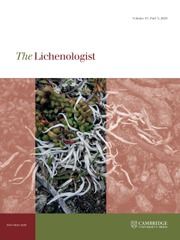The Lichenologist is launching a new award, to recognize a published paper (per calendar year) that has delivered an outstanding contribution to lichenology: the Editor's Choice Award. A sub-selection of the Associate Editors will recommend published papers to the wider editorial board, with reasons for their short-listing, and these will be voted on. This raises two obvious questions: why an award? What is an outstanding contribution?
Why an award? To answer this, we emphasize that we aim very purposefully for an award and not a prize for a ‘best’ paper as is sometimes attempted. Instead, we are choosing to express gratitude for an outstanding contribution made by an individual or team that we can feature, highlight or spotlight, as a community of scientists.
What is an outstanding contribution? In this we aspire to be rigorous but flexible. We will recognize the traditional merits of originality, scale and ambition, method design, etc., in pushing the boundaries of our knowledge of lichens. However, we will also choose to acknowledge achievements in research that overcome barriers of a different kind. This could include economic disparity, allowing that an equivalence of results does not always equate to equivalence of effort. There will be cases where individuals and teams must work extra hard to transcend economically imposed training or resource constraints while delivering their excellent science.
Furthermore, we will openly acknowledge that science is not a meritocracy, while hoping to further that ideal. The myth of science as a meritocracy has been severely challengedReference Staniscuaski1 and it is now acknowledged to be an idealistic notion that discounts socially ingrained disparitiesReference Graves, Kearney, Barabino and Malcom2, thereby distracting from transition to greater societal equality and inclusivity. We will celebrate when achievements in research have challenged or overcome barriers of under-representation and exclusion, relating to, for instance, gender, race, ethnicity, physical and/or mental disability, sexual orientation, gender identity or expression, national origin, socio-economic status, among other examples. In taking this approach, we create alignment with a set of community-wide principles that have been developed by the International Association of Lichenology, expressed in their Commitment to Diversity and Inclusion Statement (https://ial-lichenology.org/diversity-inclusion/).
It can be hard to ascertain the obstacles that may have been faced down when reading a published paper. To help, we have adapted the manuscript submission process, introducing a free text field so that authors of accepted manuscripts have the option to ‘self-nominate’ and tell the story behind their paper, should they be willing to do so. If authors wish, there may also be the option to adapt these stories into a blog post (https://www.cambridge.org/core/blog/tag/The-Lichenologist/). We hope authors will take advantage of this opportunity. To make lichenology a truly inclusive community, there must be an overall acknowledgement of the different backgrounds we have as a society and the disparity of resources available in different laboratories, as well as a willingness to appreciate research that is successfully performed with significantly fewer resources and yet is still impactful.
As a reminder to prospective authors, The Lichenologist accepts papers in all areas of lichen biology including taxonomy and systematics, phylogenetics, biogeography, community and population ecology, lichen physiology and anatomy. Published papers can be in the form of a Monograph, Review or Perspective piece, a Standard Paper for research, or a Short Communication. For full transparency, we intend the award process to follow a series of three steps:
• The Senior Editors of the journal will download citations for any self-nominated papers and submit these to a sub-selection of Associate Editors (the Award Committee).
• The Award Committee will review all published papers from a calendar year, taking into account any self-nominations, and produce a short-list of outstanding papers with their reasons for doing so.
• The short-list will be circulated to the Associate Editors, who will rank their top three choices, and the paper with the highest cumulative rank will receive the award, being announced in the March issue of the subsequent year.
The British Lichen Society will provide a certificate and cash prize of £250 to the award recipient. More information about Inclusion, Diversity, Equity, and Accessibility in lichenology is available at: https://ial-lichenology.org/diversity-inclusion/.



